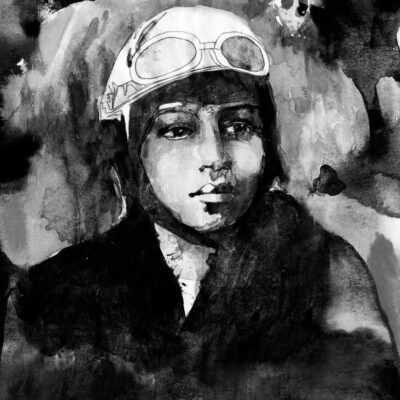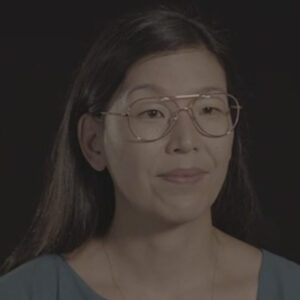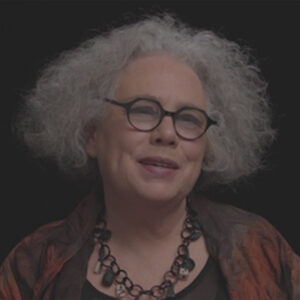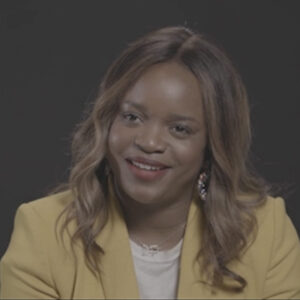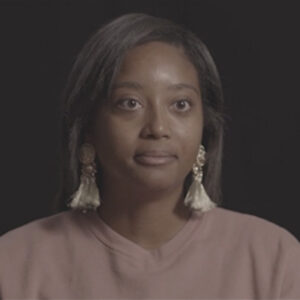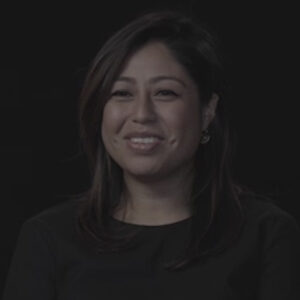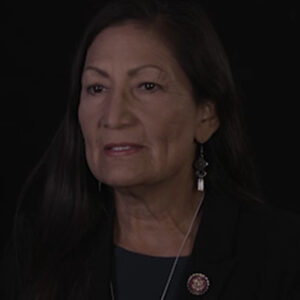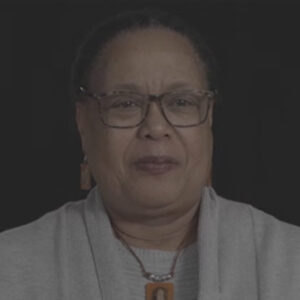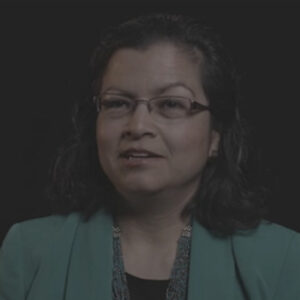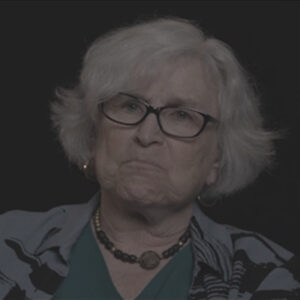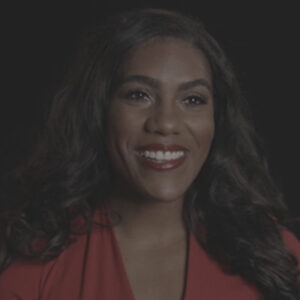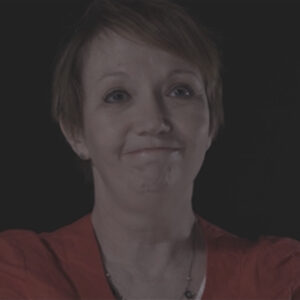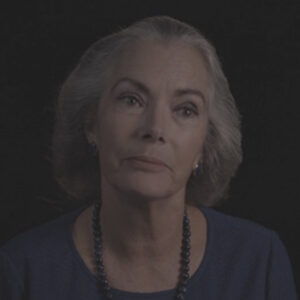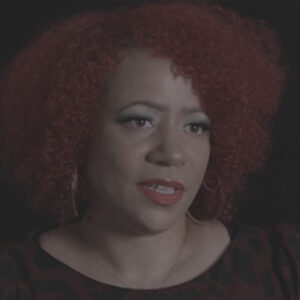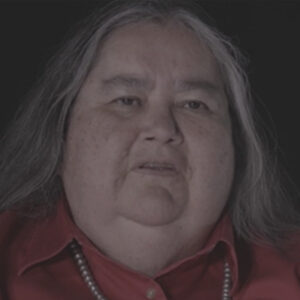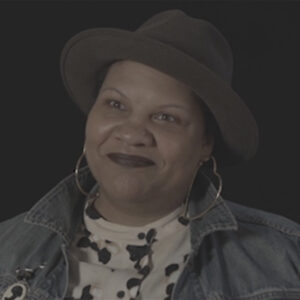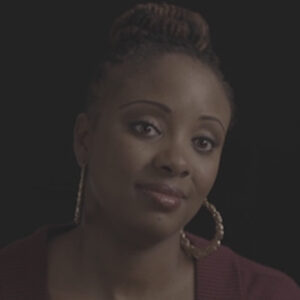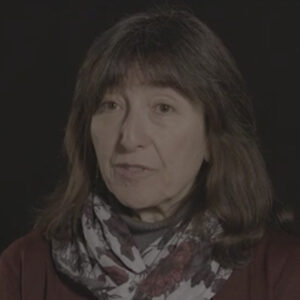Speaker OK, I’d like to introduce myself and my heart as well may be able to tell Weeble Atomic Omahaw we waited to Shonga Hobey while while he waited today Renee SAAC Mahat Warbly. And what I said was, let me introduce myself.
Speaker My Moha name is Sacred Horsewoman. My English name is Renee SaSe. I’m an Omaha woman.
Speaker And what is your profession?
Speaker My profession is an educator, lecturer and consultant.
Speaker And as a woman, um, when you describe yourself that way, what does what does that mean?
Speaker Oh, what that means to me is that it’s the tribe that I’m a member of, the Omaha tribe of Nebraska. And this tribe has been here in Nebraska for many hundreds of years. And this has become our land, our our home, our way of life. So to me, it’s all connected to the land, to Mother Earth, to our languages, to our ceremonies, cetera, et cetera, et cetera.
Speaker Tell me about your childhood. I may I call you Renee. Yes. Please tell me about your childhood. Your parents were involved in the American Indian movement.
Speaker Yes. So I was raised here in Lincoln, Nebraska. I was born in 1962 at St. Elizabeth Hospital. And growing up here, I grew up, I would say uniquely in a situation where Omahas were relocated to Lincoln at the time of the Relocation Act. And my parents moved up here along with their families, the grandparents. And when I was born, it was also during a time of upheaval. Once again, you know, the 60s and the civil rights movements that were occurring, you know, all across the country with our our African-American relatives. And it also sparked off, you know, with our American Indian movements and everything that was happening in the late 60s, especially. This was what I was seeing not only on TV, but I was beginning to see the changes that were occurring within our own communities. And here, when the American Indian movement came to Lincoln, my parents became members in the 70s. We had been living in Montana for about a year. And then we returned back to Lincoln. And after we returned in 1970, here we were in the middle of transition, not only with within my family, but also within the native community here in Lincoln. We have a lot of Omahas here in Lincoln as well as Oglala Lakotas Song and punkers and, you know, other tribes that have been here. This is historically the auto land. So as we were changing and realizing this is the time for us to stand up and to begin the reclamation of our identity, our languages, ceremonies, et cetera, it was a time that influenced my way of thinking because as my parents began this process of reclamation, then I too, was growing up in and witnessing everything that was happening, watching my my parents and other adults and and everybody that would be marching down down the street to the Capitol, you know, to bring our messages to the state of Nebraska that we’re still here and we want something to change.
Speaker So the 1978 Native American Religious Freedom Act was an important moment as part of that, because as you’ve described that in some ways your process of really becoming rededicated to traditional life was you were able to do that openly. So how did how did that impact you and your your own personal development?
Speaker For myself as a child during the time of the late 1980s, when our way of life, our ceremonial life became illegal, everything was taken underground. And once that happened, we you know, that was one of the worst things that could have happened to us. We were going through forced assimilation at that time with the assimilation policies, all the federal policies that were impacting us.
Speaker And and when we lost that way, that connection that. Was let me rephrase that.
Speaker When our people were no longer able to practice our ceremonies openly, then that impacted our the rest of our people in a way that we had we saw little choices in what we could do. Many became Christianized because they saw no other way of, you know, this was the way that many became Christianized because they saw that this was the way that was set before them. And many felt like they had no choice but to go into the churches. My grandmother was a member of our medicine lodge, which was still intact up until the 50s, and it was dismantled in the late 50s due to circumstances of that, many of our young people at that time were not willing to live the ceremonial life because in this day and age, it’s too hard to do. You know, you had to live a certain way and you had to conduct yourself in a certain way all the time.
Speaker And then, you know, to try to live well, like the make believe white people, you know, at the same time, you know, these were considered impossible standards to live by within the white man’s world. So, so many put it aside so that they could go to work. And and essentially what we all became here in the United States to live like the white people.
Speaker And so tell us a little bit about the work you do now in trying to make sure that you know about the traditional.
Speaker So what happened after the American Indian Religious Freedom Act of 1978 of this act was to help with Native American church practices and as a result of the Christian movement, this was one way that tribes could continue to maintain their ceremonies was by disguising them with Christianity. At some point, they really did become Christian and with my family, my parents, my father, especially, what he had said was, but that’s not our way.
Speaker You know, we had the way of the pipes and healing ceremonies and sweat lodges and and growing up, when I heard those words from not only my parents but my grandparents. And then I would always wonder and ask, well, what happened to them? Why don’t we have those anymore? So after the 1978 American Indian Religious Freedom Act, then that’s when the ceremonies began to return. The people that maintain them underground were able to bring them back out and practice them openly for me. Once we returned to the Omaha Indian Reservation in 1980, then that’s when I saw all the sweat lodges and ceremonies being practiced. And I, you know, immediately as I want I want that.
Speaker And it wasn’t until 1985 that I really began to follow this spiritual path, and it was through my family, you know, because my dad was sick at the time that we were able to contact a Lakota medicine man, because by then, many of our Omaha medicine people had died out and no one had picked up and followed in their footsteps.
Speaker So we were calling on other tribes to help us in reviving our own practices. And this was one way to do it, you know, to call on the Lakota, to call on our neighboring tribes, to look to them that had you know, they were larger than we were and they maintained their spiritual practices.
Speaker Tell me, when you first learned about the flesh family and Susan, unflashy peacoat in particular, I.
Speaker Growing up to understand what Omahaw life was like growing up here in an urban setting, for one thing, we had three main families here from the Omaha tribe, which was my family, the San Jose family, the Stabler family and the Sheridan family.
Speaker And these three families here were all they all came from the songstresses, my grandpa all over solstices senior. He was a roadman in the Native American church. And he maintained, along with my grandma, me, a lot of our Omaha traditional practices as such, being mainly geared toward our social dances and celebrations and growing up in that way, you know, with my mom’s teachings as well.
Speaker My mom was very strict. She was in Omaha, you know, very strict Omaha woman. And she brought me up to understand I had to conduct myself in a certain way all the time as being who I was as an Omaha woman or young woman. And I heard about the family from my grandparents and my parents.
Speaker They were in that time of the 1400’s mid to late, eighteen hundreds. They maintained a lot of power because at that time of great transition, so much was happening, so much chaos in, so much dispute within our tribe between the traditional and the progressives. And I think my family in particular, we were interpreters.
Speaker That’s what our legacy is. My great great grandfather was an interpreter for the Omaha tribe because he could speak French and English in Omaha.
Speaker During this time of upheaval, it was the Half-Breed who stood up and took charge because they were foreseeing a future where we had to live amongst the whites and we would be surrounded by all white people. And the flush family in particular, Joseph Laplanche, he Joseph Flesche saw that we were going to be overcome, overtaken, and he wanted to see not only his family, but he wanted to see the tribe adapt and be able to survive what was coming. Now, my family, the U.S. family, we were also half French in that time. And that legacy that continued from that time was that the Omahas are patrilineal. They say patrilineal means we trace the clan ship through the father’s side, but we’re also matri local, meaning that the woman, you know is the head of the household. So the home belongs to us. Well, the clan ship is traced to the father’s side. So someone like myself, as a result of my French ancestry from the census married into the Omaha tribe, I did not I didn’t I did not have a clan. And growing up, that bothered me quite a bit. I used to think, why why don’t I have a clan? Why don’t I have a real Omahaw name? Because my my first Omaha name was Suzette and Suzette, the flesh turnour. That’s who I was named after. And she was.
Speaker She was named after Susitna, flushed to both.
Speaker So you mentioned that in 2013, you actually played Susan sister. Is that the flash in the play? In my father’s eyes? Yes. How did actually playing Suzette, how did that impact you?
Speaker Well, growing up again and we rephrase that.
Speaker Throughout my lifetime, when I had heard about the Flash family, I heard two varying accounts, one that they had sold us out and the other that they had helped to save us. And with two conflicting accounts, you know, I didn’t have much to go on while I was young. I didn’t have the history books to look at. I didn’t have enough information to form my own opinion. And so ideally, I guess you could say ideally at the time, you know, I looked at my own family and I saw that, OK, this is who we are now. And to many of the Omahas, we were considered French still. And, uh. And in this place of being French and Omahaw, I had to figure out what does this mean for me? How does this relate to who I am as an Omaha woman? I had to continuously work what my ad I had to continuously work at finding my identity and deciding for myself, who am I? Who am I going to be? I didn’t understand, you know, the legacy of the Flash family, and I didn’t know that, you know, being named my Mahat name for that. I wasn’t proud of that name because to me it was merely French and I wanted a real O’Mahoney. So until I began to do my research and understand what the legacies were all about, you know, whether it was the family or my own family legacy, then I begin to embrace who I am, who my ancestors were and who I was and who I’m becoming. So in 2013, my children and I had left Macie, Nebraska, to Omaha Indian Reservation. Suddenly it wasn’t within our plans of what we wanted to do. But here we found ourselves in Omaha because I had been invited to portray that The Flash Tibbles and I really had no idea what I was in for. I was sent the script and I looked at it. And then when we all came together, all the the players, all the director, the producers and so forth, and began the reading, the practice or and we began rehearsal. Then I threw myself into the role because once I once I did that, then I could I could sense and feel, you know, that the ancestors, these particular ancestors of the flesh family were working through me. And I was dreaming about them. I was dreaming about them every night while we were in preparation for the play. And I would cry after every time of rehearsal. I would be crying that night. And I related to the cast.
Speaker I said, I really feel that Suzette La Flesh wants her story to be heard. Therefore we need to do something. So we stopped in the middle of rehearsal one time and did our little ceremony. We put out food and we all said prayers together for this work that we were doing with in my father’s eyes.
Speaker And once we were on stage practicing and rehearsing and going through everything, then I began to sense that she was really called to do this work at a critical time when the Omaha tribe found themselves.
Speaker Let me rephrase that.
Speaker So that the Flash was really called to do this work during a time of great upheaval within the Omaha tribe.
Speaker Lacework.
Speaker This work was about reshaping the future of the Omaha tribe, as well as continuing our life ways in the best way that we could, as well as continuing our life ways in the most. Tried it again, as well as continuing our life was in the best way that we could practice them and see that being at the forefront of this movement believed that she was doing the right thing. So once I portrayed her, I immersed myself in the role to and I could see for the first time what we were really dealing with as a tribe. And I could see that even with all the traditional roles that were still alive and wanting to maintain our way of life at that time, that we were just it was it was nearly impossible to do so to maintain our way. And with what happened to us, with the Dolls Allotment Act, you know, once once this was asked with the Dolls Allotment Act, once this was let me rephrase that again.
Speaker Once the doors a locked took, it’s really hard for me to say that it’s like it hurts me.
Speaker Once the Dolls Allotment Act of 1882 took effect, we saw a complete breakdown of our tribal unit, of our unity, of our way of life, and it was like adding insult to injury of already having to go through treaty signing where we were ceding away our lands.
Speaker And truly, we didn’t understand that concept because we had our territories and these territories were extensive. These were hunting grounds. These were the places where we moved from, you know, our summer camps to winter camps in all the camps that we’d have throughout the year, you know, in following the buffalo and growing our corn and harvesting all our food and medicines. This was an extensive amount of land which was coveted by the United States government.
Speaker So the dollar’s allotment act added further injury to us by then, allowing only a certain amount of land to each family or head of household. And by the white man’s standards, the head of household was male. By our standards, it was us, the women. So things fell apart even further. And everyone around us that were living nearby us were watching our disintegration and had no idea what to do. They were like, we don’t know how to help the Omahas. They’re, you know, they’re dying of losing everything. Yeah. And and truly, in a in a state that we were at that time, I could see what we were dealing with. And so when that was conducting this work, well, she was doing the best she could in that moment because literally in that moment we you know, we were surrounded by enemies all around and we literally had guns to our heads saying, if you don’t do this, we’re going to force horse march you down to Oklahoma to Indian territory. We’re going to do this. We’re going to do that. And, you know, there will be nothing left of you. That was the message that we were getting. That’s what I learned from portraying.
Speaker So that was what is unladylike mean to you and your personal definition?
Speaker I think when we’re thinking of unladylike, we’re thinking of two different world views, one being a non-native world view of what the what the definition of being a lady is, as well as to what a native world view would be. Uh, in particular, how would it Omaha see, you know, see this definition of.
Speaker As an Omaha woman, to be unladylike, is it there’s no meaning, we have no words to to state that really in our language. So the concept is something that we’re like. It’s it kind of leaves me in a way like, OK, what how would I even state something?
Speaker Well, to begin with, we’re looking at a definition that doesn’t take into.
Speaker To begin with, we’re looking at a definition that doesn’t fully address who native women are in the first place.
Speaker When the Europeans first set foot on these shores, the men that came upon these shores were looking for the leaders, they wanted to see the real leaders of the native tribes. And what they were finding was that they were being pointed to the grandmothers and to the women because we were the ones who were in charge of all the resources. And as I said, we were always the head of our households. So the clan grandmothers were usually the ones that held everything together. So we had our chiefs, we had our medicine men, we had our head men and so forth. But those individuals were usually placed in those positions by the women because they up because they showed that they were responsible human beings and cared for the people. Our role as women to begin with was as the caretaker of our families and our tribes. So it was natural to us to be in leadership positions constantly. So even if we weren’t the chiefs ourselves, we were always in charge of managing everything so that the men were in constant consultation with us and they had to in order to see that they had homes themselves. So unladylike is a description of someone, I would suppose, who was helpless, you know, that’s how I see it from my, uh, I guess unladylike is something that is describing someone who was not helpless, put it that way, because being a lady by European standards meant that you had no control over anything. And for an Omaha woman, we had the say over everything in like I said, we were the heads of our homes. We had charge of all the resources. We knew exactly what to do all the time. We weren’t helpless. So if we weren’t ladies, I you know, to me, I don’t know what I could say. That was always the way we were. So for me, growing up, I think during this time, again, like during the 60s, 70s, 80s, 90s and so on, uh, my mom being a strict Malchow woman, she was coming up with the kinds of teachings that she had from her grandparents who raised her. She brought me up, I would say, to be like a lady.
Speaker And I would, you know, in my travels everywhere I would go amongst all the other tribes, they would always say that you really are distinguished like a lady. And I’d always wonder, what did I mean? You know, and all it meant to me was that I had good manners because that was what was impressed upon me. I was supposed to conduct myself this way all the time. So to be unladylike, I suppose, was that then I didn’t have any manners. That’s how that’s how I was trying to understand. So. Whereas with the Omaha women and native women throughout Turtle Island, we were always powerful women, it was only once the assimilation practices, you know, everything that happened to us over the past 500 plus years, that our lives were impacted in a way that we were beaten into submission. So we were supposed to become like two European women or ladies out of that time period.
Speaker And.
Speaker In this time now where we’re living, we’re dealing with so much racism because of the colonialism that we have endured, but the racism has led to many problems with our young women and older women. One of the things I work on right now because of the impacts of colonization is the missing and murdered indigenous women. And I wear this because this was gifted to me for some of the work that I have done. I wear a red skirt because that’s also a symbol of the MMW movement, as we call it. What we’re doing is we’re bringing attention to what has happened to native women over the last 500 plus years, the violence and.
Speaker The violence.
Speaker And the rapes and the murders that have consistently been inflicted upon our native women because we weren’t seen as human beings and still aren’t seeing as human beings.
Speaker If you can talk specifically about the issues of the diseases, especially smallpox, yes, impact of that on the island.
Speaker There was a time when the Omaha tribe was a thriving tribe. There were many of us and we were powerful. And it just was during the late seventeen hundreds. One of our principal chiefs was chief blackbirded and he was very powerful in the way that he could employ certain. He was very powerful in the way that he could employ certain devices that kept all the people under control. The Omaha tribe, as well as to the Europeans that were coming around to the perpetrators and so forth, he had kept everyone he kept everyone on their toes because he could see everything that was happening with all the scouts that he had in place. So he was very. He was very intelligent in how he carried out his power and.
Speaker Truly, I believe that because of his.
Speaker Truly, I believe that because of the kind of power that he wielded amongst other tribes as well, he wouldn’t allow the fur traders to take arms further upstream to the other tribes, and he kept them mainly within the Omaha tribe. So we were well armed in comparison to the other tribes around us. And he went to visit one of the neighboring tribes, the Pawnee. And while he was there, he came in contact with smallpox. And smallpox was one of the uses of the people that came here as germ warfare because they saw the devastation it was taking on our people all across Turtle Island. So here it was. It came to us through our chief Blackbird, and our people were decimated.
Speaker And then.
Speaker It happened again and then it happened again and it got to a place where our people were thriving, like I said, we were to our historians, to Omaha tribal historians, our numbers were well into the twenty thousands. And back in that day, how could we, you know, take a true head count? Because sometimes we were moving around so much and our bands, our people were would be off in different areas at different times. So I believe what my tribal historians have said, that our numbers were large and when smallpox came decimated us. Some say we went down to 300, others say to about a thousand. So it’s, you know, conflicting reports like that that are hard to determine that, you know, that our numbers were really low. How low? Lowest? Three hundred, maybe 1000.
Speaker And the impact upon us was devastating, the impact upon us was like. If you can imagine.
Speaker Having, you know, a city of a million people or so and then having and seeing more than three quarters of that city wiped out within a short period of time, say like five years, then you could imagine the kind of devastation that my tribe was.
Speaker Facing.
Speaker So let’s talk about the other half a simulation, I think it’s really interesting that both of them are Flash’s parents. Joseph and her mother, Mary, were both mixed. Yes.
Speaker And you talked about, in some ways, Joseph, our eyes, uh, kind of seeing ahead in terms of, um, the impact of. The colonial period, so talk a little bit about, uh, her family and kind of promoting the idea of. Omaha, assimilation.
Speaker OK, just from that question, I’m going to back up a little bit of one of our other principal chiefs was Chief Big Elk on Putonghua, and I’m a descendant of Big Elk and the first one, but also, you know, coming down to his, you know, to his son. To the latter. One who.
Speaker Travel to Washington, D.C., and saw what was happening there in that great city and saw all the people that were there, and the next part of that was that in this process of.
Speaker Trying to help the people he sent people he sent his young people out to fast, and during those vision quests they returned with all these visions of the future. So they were coming back with reports of this is what’s going to happen. These things are coming. This is the kind of this is the kind of technology that, you know, we’re going to see in the future. So they foresaw airplanes, they foresaw computers, everything that we have now.
Speaker And back in that time, this was a concept, you know, was overwhelming for not only Chief Big, OK, but for all the people around, you know, all around him during that time. So this is when he began, you know, made his big speech about, you know, preparing the Omaha tribe for what was to come. And in that speech, he told everyone that they would need to adapt and to change in order to survive. And during that time, also, he took Ironi as his son. So he adopted him in a ceremony and then proclaimed him to become the next principal chief. In his place, so once iron, I took hold of the power. I think, you know, for the time that he was living and he saw what he could do, like just like our chief Blackbird, he also saw that he could wield this power. He also saw that he could wield this power in a way that would benefit his family, you know, his children especially, and then in return also to the rest of the tribe. So he influenced his family, his children, that they had better seek out Western education in order to not only to survive, but to to be successful.
Speaker Um, can you tell us about the concept of the young man’s party and the village of make believe white people?
Speaker Yes, uh. When he was when he had formed a young men’s party, this was with our mostly, I would say all the half breeds as well as the people who wanted to become white people, as they said they wanted to see a way of life that was easier than what they were enduring at the time, which was famine, you know, and, you know, not having very good homes. I mean, I guess they grew tired of being cold and hungry. So they saw this way as the best way for them so that they would have security, you know, for them, for themselves and their families, for the future. The traditional owners were the ones who wanted to hold on to the land and hold on to a way of life that we had practiced for hundreds of years, if not thousands.
Speaker Just way of life was about being connected to the land, connected to our ceremonies, maintaining our languages and our way of our world, our world view of being connected to Mother Earth as well as.
Speaker It was a way of being balanced. The young men’s party.
Speaker Began taking in the homes and constructing homes like white people, and these homes were then for.
Speaker These homes were then called Village of the make believe white people are white men. Because the rest of the people, the Omahas. Wanted to live, continue to live in our traditional homes like the Earth, lodges and teepees and our bark houses and so forth, and these houses were big and and unwieldy. You know, they weren’t compact. You know, they were.
Speaker I would say at the time, I can I can imagine both sides at the time I imagined when I put myself in the traditional place, I could see how these homes were totally foreign and.
Speaker That these homes are also environmentally, you know, they they made no sense. As whereas our homes were very environmentally friendly, what we’d call today, eco friendly. That’s what our our traditional homes are like, the original eco friendly.
Speaker Yes. You know, eco friendly.
Speaker Um, talk about the Omaha Allotment Act of 1882. And again, as you’re saying, in terms of this evolution of the land grab, if you will.
Speaker Yes. Well.
Speaker After all the treaties were signed and the lands were ceded, and then here comes the Allotment Act to further disrupt our way of life. The promise was that our land would be held in several times, that our land would not be further. Uh. Dismantled, you know, the promise was that our land would be intact and that we would be able to live there freely as normal people. That wasn’t how it was carried out.
Speaker Many Omahaw saw it as a way of, well, you told us we could live here and we would be free, we would be able to live the way we would want to live. But now we’re being told that our land is divided into allotments for each family or each head of household. And not only that, now we’re being told that we have to become farmers. And back in that day, to be a farmer was a foreign concept because, again, the farming practices were all all belong to the women because we took care of the land and we harvested the food and medicines. So the man at the time, the Omaha men, saw it as an insult that they would have to be become the farmers they were expected to do, you know, these kinds of practices that were completely forward, having a plow, tearing up the land? You know what will stop? You know, we didn’t do that. That wasn’t a part of our practice, our our way of gardening and planting our corn. We’re in a very natural state. And we had, you know, our garden surrounded by natural plants that acted as deterrents to critters and, you know, to, you know, to the animals, to the bugs, to everything. So all the critters were kept away without being harmed. This way that we were forced to follow now meant that we had to tear up Mother Earth. We had to do it enrols. We had to do everything according to your American standards, which made absolutely no sense to us.
Speaker So.
Speaker Once again, you know, we were given things that we just had no connection to. Our way of life that we saw the beauty of our way of life, that we once held in high regard, you know, of how we connected to the Earth and how we worked with Mother Earth, was now being forced to turn into another way of destroying the earth. That’s how we saw it. And yet we had little choice. So here we were again. Now we have to become farmers, OK? That was happening. The impact that I could say I grew up with was the result of how my mom was raised. So she talked about that all the time. My mom. I was raised by her grandparents and they were living in a farmhouse, they had a lot of land, my mother’s land and her grandfather farmed that land. So they had a lot of everything, vegetables. They had animals like cattle, horses, chickens. So by by moral standards, they were wealthy. So my mom grew up wealthy in that in that state for a long time. She had an outlook at that time that was a result of the dollar’s allotment act and all the assimilation policies. You know, she was sent to boarding school. She was brought up in a way of being very Omahaw because she could speak to Omaha and Ponca dialects fluently. But she was also brought up in a Christianised way of life, as well as a way of life that, you know, she saw slipping away at that time, which was our traditional ceremonies. She was witness to both the Christianity and to our traditional ceremonies. This was the result of what happened with the Dallas Allotment Act. So my mom was a hard worker. You know, she was you know, she took care of the animals. She took care of the horses. She helped, you know, with the gardening.
Speaker She helped her grandmother with drying meat. You know, she did everything that would be considered traditional by today’s standards. So now she grew up and she was always driven by mom. The impact it left upon my mother was that she was driven to become educated. But not only that, she wanted to see all her children become educated.
Speaker In the Western way.
Speaker Where we’re talking about, uh, Susan, of course, you know, you talked about Suzette and so we’re talking about Susan in particular. Susan is her own older sister. So Susan talking about her family, her early life and her education. So what would her childhood have been like?
Speaker And then, um.
Speaker And Suzette did going to Elizabeth Institute and then Hampton, OK?
Speaker Mm hmm.
Speaker When I think of the historical aspects of what it was like to be a woman. I go back to my own family first in order to frame know the world view at the time and.
Speaker I go back to. The understandings of. A.
Speaker The understandings and the teachings of the mark of honor women.
Speaker And my.
Speaker My great grandmother was one of the mark of honor women, so can you tell us what that means?
Speaker By the mark of honor, women were the women chiefs.
Speaker To become a member of this society, it meant that your father or grandfather or uncle, someone in your family was being someone in. It meant that someone in your family was being initiated in who watches society, which was the night that society. This was a society for the upper chiefs, you know, because we had a very hierarchical system of leadership. So to become a mark of honor. Woman You were doing so because your father or uncle or grandfather was also being initiated. So in order for it, in order for a male to be inducted, to be initiated into the society, he had to have a female counterpart in order for male to be initiated into the society. He had to have a female counterpart. So that this young woman who was then initiated into the mark of Honor Society had to go through the ceremony from daybreak until noon or dizziness, and the society was, uh, was such that the women became women chiefs after they were initiated. Their roles and responsibilities were to take care of the people and to take care of the people. They had to watch over the little ones, especially those who were orphans. So my grandmother, my great grandmother was one of these women. And the way my family described her, my mother especially, that I had met her once she married into my father’s family, just this great grandmother was my father’s grandmother. So she had. She had a way of when she walked into the room.
Speaker Uh. Everyone was at attention.
Speaker She had a loud voice so she could be heard. She issued out commands, which everyone is expected to follow and did, and it was that kind of presence that she had.
Speaker This presence of being. In charge.
Speaker So when I think of the Bush family and love black women in particular, since Ironi was considered to be one of the last principal chiefs at that time.
Speaker These women were also expected to conduct themselves as chief starters or mark of honor women. I know that that was initiated into the mark of honor society. However, she did not go through the elaborate tattooing ceremony that these women went through. So she didn’t have the marks of honor, as we say, in this time. And the reasoning behind that was that her father did not want her to go amongst the white people carrying these marks and setting herself apart from them.
Speaker He wanted her to blend in with them as best as she could. So for for the low flush women from Suzette to Suzanne. Four of the flash women from Suzanne.
Speaker So instead of focusing on you said, can you just talk about Susan?
Speaker Yes, so. So but this is what’s leading to Susan.
Speaker OK, so so for all the flesh women from Suzette to Susan, each one was expected to conduct themselves as a chief starter in the same way as a mark of honor woman And as I stated, these women were to take care of the people and take care of the children, especially Susan’s work led right into that when she went through the Western education of going to the Elizabeth Institute and the Hampton Institute and then going off to medical school to her because she was much like her sisters. And fact, they were brought up in a very traditional Omaha culture while at the same time being told to embrace the European standards of living. She decided she was going to do her best at being a daughter of a chief by serving her people as a doctor and because, again, at the time we were deprived of so many of our medicine people. After the smallpox is up, after the smallpox epidemics took out so many, we had no longer had access to our traditional forms of healing. So here is someone like Susan. Here’s someone like Susan Laplanche who embrace this modern way of healing.
Speaker And she became in one way of looking at it, a modern day medicine woman.
Speaker And once she did that, she decided, well, I’m going home to serve my people and to take care of my people in the way that I’m expected to and I’m supposed to. So she was fulfilling that part of her role of being a daughter of a chief as well as being, you know, a doctor and taking care of the people.
Speaker So it is interesting, as you said, she returned after she got her medical degree. Yes. As a doctor, but it was for the Office of Indian Affairs. And again, it’s that it’s kind of that that duality. Yes. Of doing something, showing her commitment to the people, but also doing it in a structure that was also kind of contested. Yes. So can you talk about that a little bit, that she was committed to healing, but I guess was was was this the only way in which she felt she could do it?
Speaker Well, again, during those times, what did we have left? You know, we were forced to do so many things and this was probably for her at the time. That’s how I feel. It’s like this was the one way she could do it. It’s kind of like what we have to do now. You know, we’re in a similar situation now that we can completely live on the land like we used to. I mean, my heart and spirit longs for that. I wish I could, you know, return back to the land and be there all the time. And that’s just not happening. And I’m forced to constantly deal with Western structures and I have to because I have a family to take care of. So I have to constantly make choices based on how am I going to do this, you know, and still be myself. How do I have to gear my words? How do I have to say this? What forms do I need to fill out? How do I you know, it’s a constant practice of I’m still on Omaha. Woman I’m still very traditional in my practices, spiritually and so forth. And I still love my community, but I still have to survive. And if I have to go to school and do that, OK, then I have to do that. I believe that during this time of transition that my hands were living back in 1800, 1880 and so forth. This was what she had to look at as well. She had to consider all her choices and say, OK, this is how it’s going to be possible for me to serve my people. And if I have to do it like this, OK, I will do that. It would be like me if I became a medical doctor. Now, where would I have to work? If I wanted to serve my people, I would have to go to the Indian Health Service, which is essentially still under the United States government.
Speaker So how did she how did she function as a doctor?
Speaker What were the conditions that she was dealing with and what would some of the main illnesses that you feel like she was she was making herself available to treat?
Speaker I believe, you know, at that time we were impacted by influenza and as well as quick consumption or to back quick consumption or tuberculosis. And again, I feel that, you know, she was looking at herself as I’m dedicated to my people. I’m a chief Stalder. So I’m going to serve my people in this way. And like the mark of honor, women would do, you know, their doors were open all the time to the people and they served the people in the best way that they could at all times. So if she went out, she was thinking that way all the time, like, OK, what do I need to do today? I need to go over here, you know, about 10 miles, 15 miles, 20 miles, whatever that would be. And if I don’t have a horse and wagon, OK, then I’ll go on horse. And, you know, this this was her frame of thought to help the people who are sick. Tuberculosis was rampant and tuberculosis was rampant during that time up until, you know, into the 40s. And my my mother’s mother, my great mom, my mother’s mother, my grandmother died from quick consumption in in the early 40s. My mother was very young when she passed away. So I know that what she was seeing was the results of, again, of colonization. It left us with little resources to tend to our own health. We were impacted by alcoholism, which again, further. Yeah, which again, further.
Speaker Let me rephrase that again, we were impacted by alcoholism, which further set our people back because of the effects of.
Speaker Which further set our people back as an effect of genocide.
Speaker The. You talked much earlier about. How some Omahaw really saw no other choice but to become Christian or to kind of synchronise traditional ritual with Christianity. Yes. So, Susan, the flesh was, um, was it was a Christian. Yes. Yeah. And so did that put her in conflict with some of the indigenous practices?
Speaker Yes.
Speaker Because she was. Very strong in her beliefs as a Christian woman. This also conflicted with traditional beliefs at the time because, like I said, there are still many traditionalists that were clinging to what we had left and.
Speaker Whereas she was.
Speaker Whereas she was pushing forward with assimilation as a process of helping our people to survive, it went against many Omahaw people, the beliefs of the Omaha people at the time, because we you know, as Omaha people, we wanted to remain who we were.
Speaker We wanted to have our belief systems. And it was hard. How could we how could we survive if our ways were illegal?
Speaker There may be practices that traditional practices that, as you said in the Western context, are hard to understand, such as peyote.
Speaker Mm hmm.
Speaker And but there was ritual use of peyote, not, I guess you could say.
Speaker Recreational or social use? Yes.
Speaker So how did her anti peyote position, how did that how did the Omaha people perceive her?
Speaker Well, at a time when. Peyote was introduced to our tribe. You know, the.
Speaker Again, this was seen as a way to help us to maintain our. Our traditional ceremonies.
Speaker And because we could say that it was Native American church then that helped her to. That helped in making it possible to still practice our traditions without it appearing to be.
Speaker Two native.
Speaker And I could understand her position, you know, of being antipode, uh.
Speaker I think because as good as something that was a traditional medicine, it had many usefulness. Let me rephrase it as. Already had a very powerful.
Speaker OK, let me go back and rephrase that again, my mind’s going all over the place like.
Speaker I want to say this in a way that’s respectful to our people now, but also in a way that reflects, you know, all the history behind it.
Speaker Oh.
Speaker When the Omahas adopted POTUS, it was to maintain our traditional ceremonies and with her antipode approach, it was offensive to so many because, again, they felt like she was attacking our traditional ceremonies, what we could still practice. In a way, I can understand, because I, too, grew up in a way like my dad would say, that’s not our way. That was something that was taken up as a result of what we had gone through. Uh. And he didn’t allow our family by myself and the rest of us to go into the peyote ceremonies because my grandpa was a two year old man. So I grew up being around it, but not practicing it, so. Her stance, I can very well understand in a sense of that she was seeing as that was further denigrating our people because of the drug influence, I suppose, uh, I have respect for it in a way that it can be used in ceremony. But I also have a respect for it in a way that I don’t follow that tradition. I return back to my own, uh, my grandmother’s traditions in a way that doesn’t use those that kind of, uh, drug.
Speaker And, um, can you also talk about, uh, you refer to it a little earlier, the the issues of alcohol? I mean, I feel like on one hand.
Speaker Again, it’s it’s kind of the two sides of the coin, on one hand, um, native people, I have been somewhat stereotyped around the issue of alcohol.
Speaker Yes. On the other hand, alcohol has really had a devastating impact. Yes.
Speaker On.
Speaker Indigenous people, you know, the original American century, and so she was very, very active in this temperance movement and in prohibition. Yes. And and witnessed the impact of alcohol on her own husband. Yes.
Speaker So, um, can you help us to understand how how we should, again, view her relative to this issue of of alcohol consumption?
Speaker Of.
Speaker Well, if you can imagine, you know, and this is what I often when I’m teaching. About our history, I try to get people to imagine what it was like during that time and put themselves in that, you know, in those places.
Speaker Alcohol was introduced to the Omaha tribe, to the fur traders, and when the fur trading was happening from the late seventeen hundreds, you know, to the mid eighteen hundreds, you know, we saw the impacts of that in particular on our tribe, but we also saw the introduction of alcohol through the trading system. This was deliberate in a way to. This was a deliberate act to bring our people further down. We were already in this downward spiral and now here was something else that was introduced to to the men at the time because.
Speaker You know, the.
Speaker Because the effects of alcohol.
Speaker Were temporary, you know, they could self medicate. You know, they used it as a process of.
Speaker They used it as a process of numbing themselves to everything that was happening all around, but once it took a hold of everyone, then you saw a change, a complete change in our tribal structure and further, you know, denigration.
Speaker Desecration. Yeah, and.
Speaker She was witness to all that that was happening.
Speaker So our once proud people now became. Easier to manipulate. So what she wanted to see was, are people to become healthy and strong again. And to use what we had, which was what we had, you know, ourselves in particular, are our minds, our bodies, our spirits to use what we had to continue going forth to survive and to become strong again.
Speaker So not only was Susan the become the first Native American doctor, but. She founded a hospital which was the first privately funded hospital in Indian territory, so again, as you said, kind of putting. Ourselves in that time period, that must have been incredible that she was able to actually build a hospital and in some ways so she didn’t have to travel because of her land was so big.
Speaker Yes, you have to travel over such large distances that people actually have a place that they could come to. Yes. And people could be trained it.
Speaker And so it must have really been just an amazing accomplishment.
Speaker When you think about that time, that. With where we were at, you know, with such little resources, because even though they were giving us money and giving us, you know, rations, whatever they whatever was conceived as just compensation, it was not, you know, it it was just a fraction of what we were supposed to be receiving. And in you know, in regards to the land that we seeded and saw her act of returning home and becoming a doctor and then, you know, deciding determining that she was going to build a hospital that in turn, you know, showed that she had a strong character. She was able to pull everybody, you know, all of her funders together to begin this process and made it happen.
Speaker I think as a result. You know, the people that did go there for help, you know, there’s you know, that hospital still stands there. I have spent considerable time in that place for various reasons, you know, for meetings, you know, to conduct my own research.
Speaker Even stayed there a couple times and. I had to look at it and walk around in there and think, you know what, you know, what did this place represent to our people at the time? And I can only imagine that the people that were coming there convalescing, you know, staying there, seeking services for just about everything, you know, they it was a good place for them at that time. A safe place.
Speaker In terms of I guess you could say. Social service institutions would have been one of the kind, in a way, would there have been other structures like that?
Speaker I think at the time, it was one of a kind and.
Speaker I don’t know of any other structures, I mean, you know, there’s different kinds in on the different reservations, but they were usually church oriented and not private. So this in its own way was quite unique. Uh.
Speaker Does it still function now as a hospital?
Speaker No, it’s more now.
Speaker The hospital is like a museum piece, so it’s maintained, you know, in in a way for display and people the Omaha tribe will have meetings there. And at one time there was a sweat lodge there. I don’t know if there still is, but I know I did go to sweat there at one point.
Speaker But I thought I heard that there was there was something underway to try to really kind of re-establish it. Is that do you know that’s not one?
Speaker I’m not sure. OK, so I haven’t been in touch with. What’s the current process now? You know, I think I know they have a board and I know that there are efforts to reestablish something, but I don’t know what, you know, if it’s going to be like a showpiece, a museum piece or if it’s going to actually become something further. I mean, it has.
Speaker It has served as many different things over the years. Yeah, so it wouldn’t surprise me one bit.
Speaker So as we’re looking back on the life of Suzanne Flesh peacoat, um. She was born into a family that was promoting assimilation. Did her views about assimilation change over her lifetime? Did she begin to see the limitations?
Speaker I think once she was back here on the reservation, you know, and taking care of the people, having all of these things happen and.
Speaker She was witness to all the you know, to all the policies, so I would say she would have you know, I feel that, you know, by the time she was dying herself, you know, she knew that she had done the best she could, but it would still not be enough to overall save us, I guess, you know.
Speaker What are some of the qualities that, you know, if you are describing her, what are some of the qualities that you would say to find her? I mean, you already talked about the tradition of being a chief’s daughter. And so. You’ve said that about it, but what are the other ways you would describe it?
Speaker I think she and her sisters, her family and so forth, what they had said was they set a precedent for how Omahaw women were supposed to be. So, um.
Speaker Omaha women are supposed to conduct themselves, you know, in with good manners at all times, the way we’re supposed to move is supposed to be a certain way. The way we’re supposed to wear our hair is supposed to be a certain way. And how women are supposed to have their hair tied back all the time and either in a braid or tie, you know, in a bun, you know, put tied tightly, like, you know, if you see pictures of Dr. Peacock and you see how her hair was, this was how Omaha women are supposed to conduct themselves to this day.
Speaker You know, we’re supposed to wear these kind of, you know, dresses and and at the same time, uh.
Speaker Growing up, you know, I understood that that’s how I was supposed to be, you know, and at the same time I thought, well, I don’t like to tie my hair back. You know, um, it gives me headaches. You know, my hair is too heavy. My hair won’t stay in a bun. It’ll slip out. And it’ll and the tradition is we’re supposed to have our hair tied up because that shows that we are being proper. But also, if we don’t have our hair tied up and hair down like mine is, we’re in mourning. So my grandpa, you always say that to me. When I was young, like my daughters, Renee must be in mourning because her hair is always down, you know? And I would try to tell him, Grandpa, when I braid my hair tight like that, I get really bad headaches. So I just leave it alone.
Speaker But then I heard him and I understood that wasn’t expected, you know, standard I was supposed to maintain. But that was one thing I couldn’t do, you know? And now I just say, OK, if I’m going to do this and still conduct myself as an Omaha woman, that doesn’t necessarily mean I have to have my hair in a certain way all the time.
Speaker But these women did something. You know, I was reading about Margarete in the flesh and how she had become a teacher, but she was also taught to teach all the Omaha women how to dress and conduct themselves.
Speaker And I feel that that influence impacted us, like I said, into how we were expected to dress all the time. Uh, sure. I go around in T-shirts and jeans, you know, and, you know, I do myself. I guess I try to blend in sometimes. I don’t want to call too much attention to myself at times. But for the most part, if I want to just dress this way, I will you know, if I want to wear my moccasins, I will. You know, these are my everyday moccasins. They’ve been through a lot of wear and tear. So to me, I feel like if I want to dress this way, then I will do that every day if I want to. And no one’s going to stop me. And people might ask questions, but that’s about all, you know, um, I think there was a point in time when we couldn’t dress traditionally, we couldn’t wear our buckskins. We couldn’t wear our moccasins. You know, we couldn’t wear our sacred items, you know, and so forth. But now it’s like, uh, how we wish to interpret ourselves and how how I’m going to do that as an Omaha woman is is definitely up to me. That’s what I’m seeing and learning.
Speaker So for her.
Speaker I really feel that she was living what she was supposed to be doing at the time, she really was doing her best and she did more than, you know, what was expected of her. What can we say, you know that. Any of us can do the same.
Speaker Well, what do you think her legacy is, how do you think?
Speaker Suzanne, a record should be remembered, I think she should be remembered in a way that she had lived with honor because she did live an honorable life also with the truth in what she was dealing with at the time, why she had the views she had, you know, of being in an assimilationist and why that went against what would be our traditional way of life. Because I think when you present both sides equally and what was happening.
Speaker OK, settle down. So, OK, if. She was living. This way.
Speaker Let me start again, because I what I want to say is about how both sides were being presented at that time.
Speaker She was being who she was expected to be in her time. And how she was doing it. Whether. She was promoting a simulation or dedicated to the people in a traditional way of life. What needs to be shared alongside her life is what was really happening at the time with our people who were traditional and with those who were progressives, what was really at stake, you know, was. To me, was always about economics is always about money. So who was going to benefit here? You know, to me, when I look back at that time, I see that. There was a lot of money being made somewhere and by some of the people and for a lot of people who were going without, you know, this was because they were holding on to what we consider to be Omahaw. We wanted the land. We wanted our way of life versus, you know, becoming progressive and becoming assimilated. But you can see the process now, you know, the effects of what she had lived through, what she had promoted, because this is how we are now, where we’re still living on our land. We still have some of our ways intact. We’re fighting so hard for our language. We’re doing everything we can to save our language.
Speaker You know, my mother, my mother, Alice, was one of these individuals that saved, you know, worked. My mother, Alice, was one of these women that worked on our language. She passed away in 2015.
Speaker Uh.
Speaker The results were like shown, you know, this one also shows. Stories of went on a ceremony.
Speaker My aunt Eleanor Baxter and my mother Alison, to see their stories are told in here. My mother passed away in 2015 and Wenonah Karaman, her Omaha name, was how she passed away this year.
Speaker These stories are very powerful because they talk exactly about the impacts of what Susan was living through and how this impacted, you know, my relatives here. So I’m living through that now. You know, we’re still continuing to go through this process of assimilation, but also in the process of what I was living through in the 60s and the 70s and how that impacted me. And then seeing all the things change in the 80s of reclamation.
Speaker So reclaiming our identities, we reclaiming our languages, we’re reclaiming our ceremonies, which is what I practice now, what I had to go to other tribes to learn to relearn are Omahaw ceremonies and then to bring them back into a place where this is what we had. We had this. Now we can bring them back.
Speaker This is what’s going to help us now for the future. This is kind of the irony, right? This is the irony that back in the 1980s, they were talking about assimilating to. To survive what was coming and here we are now, this generation that have, you know, have lived through this time period, we’re talking about, we have to bring back our ways in order to survive what’s coming in the future.
Speaker So in the last in the last few minutes, we have would you would you call Susan Rice to be called a woman of service? Yes. Was she a woman of service to her community?
Speaker Yes, I would say that.
Speaker Can you can you say that in the.
Speaker Susan will flush Pickar.
Speaker As.
Speaker Who she was at the time, you know, her identity, she became Omahaw, she was Omahaw, and then she was doing the best she could in what she believed to be in service to the people. And as we look back at, we can also see that, OK, this is where she was living through this is what she did witness. And these are the results. You know, she she did the best she could at that time, dedicated her life to serving the Omaha people. So in a way of being a woman of service. Yes, she was.
Speaker Thank you. Is there anything we didn’t cover that you think is important to mention?
Speaker Let’s see. I think are you. You know, I know that you had and I was trying to, but I didn’t get to that point.
Speaker Oh, when you talk about the revival, the reclamation, to make sure that those traditions live on for future generations, um, our young people, are they are they willing to.
Speaker Be part of that process to make sure that the practices continue as lived, you know, not just in books, but really as lived experience.
Speaker Yes. So let’s say.
Speaker So in this current time frame that we’re in. Many of our women have of.
Speaker Stood up now, uh, in order to speak out for not only our women, but for the future generations and in turn the future generations, as they say, the ones that are in this time period, but the ones who are even aren’t even here yet. The young people that have stood up now, they’re the ones who are saying, we want to learn these things. We want to know our languages. We want to know what our ceremonies were. We want to know how to plant our traditional gardens are. We want to know how to harvest our medicines. You know, we want, you know, to work with the environment, Mother Earth, in the way we once had. So you could say that the greatest travesty in this whole story was that we were disconnected from the land. So now for us to reconnect to the land, the process is one that we’re we’re striving to overcome constantly, because, as you can see, many of us are urbanized. Most native people, over half that are here in the United States are our urbanized. We live in the cities and in half or less live on the reservations.
Speaker What are you want to see is how they can go and do this work in the way that their ancestors did. They want to learn the process of reconnecting to Mother Earth. And in order to do so, they need to know their languages and they need to understand how do they how do they go and pray. That’s something simple, but it’s something that we’ve had to learn how to do again. How do we pray know how did Omahas pray? How did Lakotas pray? So on and so forth. All the tribes I married outside of the tribe, I married into the Oglala nation. So my children as as a traditional I guess we you know, because again, the patrilineal belief are, you know, our children follow our our children follow our father’s side. So therefore, my children follow their father’s tribe. And they are Oglala Lakota. And they identify as such, and for me, that task was to help them, so to help them form their identity as Lakota people. You know, I’ve had to embrace the Lakota way of life as well, in addition to my own, and then to help them to reconnect to their people, to understand who they are, to know their history. So I’ve had to learn their family’s history and their tribe’s history as well, in addition to my own and even to go as far as learning the language. So I’ve I’ve studied multiple languages in order to help youth to understand that they can connect back to the languages because so many of the language oh excuse me, so many of the youth I encounter are Lakota Maha Punker, you know, whole chunk.
Speaker And they’re all wondering like, well, how do we do this? How do we connect back to our languages when we don’t have language teachers here or how do we learn this? And so here I find myself trying to help them in the best way I can. Sometimes I can direct them to some really good people. Other times it’s like I have to work a little bit harder at helping. Are you really want this way of life back? They want to see something for the future because they know of you know, they’re very aware of climate change.
Speaker They were very aware of what were going to be dealing with, you know, in the coming years. And that’s what they want to prepare themselves for. In addition, I see myself in that place. So this is my work. This is what I’m all set here to do, was to help a people, but not only my own people, all these people that come to me assist them in helping them find their way. Whatever that means to each one is different for each person, but for our youth especially, I’m dedicated to serving them. And this is my my vow.
Speaker Um.
Speaker So let me I just let me I do have to ask you this, so within the Omaha tradition, are women or girls taught about the love family or are they taught about Susan?
Speaker Is there a way it would say is there a is there a in the telling of oral history? Is she is she mentioned or how? How at all do you think her memory? Is. It’s to give it all.
Speaker I think it’s mainly taught in the schools, so, uh, for each family, each family in Omaha tribe is going to have their own, uh, family traditions and histories. So they’re going to focus on them mainly. But if they’re going to be in school, like Omaha Nation Public School, then they’re going to be learning about the love family and they’re going to be learning about things that are they’re going to be learning about Susan Laplanche Peacocke.
Speaker It’s interesting, you know, being a person who is not from this area and. So one of the largest cities in the state is Omaha.
Speaker Mm hmm. Um, I can remember growing up, you know, seeing ads about Omaha Mutual, etc..
Speaker So in some ways, the word Omaha was something that I think is part of my even my own memory. But I didn’t really understand what it was attached to. Yes. Um, so the fact that these names do exist that just kind of give credence to the Omaha, do you feel like that, um, that that is something that is is good relative to the Omaha history.
Speaker I think that the fact that Omaha. The word Omaha spelled out MHRA and pronounced Omaha is so well known throughout the United States and yet relatively connected to the Omaha tribe of.
Speaker It’s like you can go anywhere in this country and people will be familiar, like what you said with the Mutual of Omaha because of the Mutual of Omaha Wild Kingdom. And, you know, we all grew up watching that show, you know, like in the 60s and 70s. And and I always remember seeing that symbol of that headdress and thinking that must come from my tribe. So immediately I associated it with my tribe, not thinking that these this corporation had taken their logo and our name and utilized it for their purpose.
Speaker So in a way, exploited us in order for their own financial gain. That never crossed my mind, you know, until I got older. And then the city of Omaha, of course, being named after us, you know, because that’s where, you know, it was kind of like a place of what we’d call comments. You know, Council Bluffs were there in Iowa. That’s where tribes would meet, you know, to have negotiations for for all kinds of reasons.
Speaker So, you know, Omaha, Mahat, you know how we say Omaha.
Speaker The story is that when we were making our journey up toward these lands, you know, several hundred years ago, we were separated from our relatives, the Quapaw, who Garba in our language to Koppa down in Oklahoma and Arkansas now. And we were separated on the river, some say the Des Moines River. Some say to Missouri, you know, there’s conflicting reports about that. But we were separated. We were all going upstream. And one of the boats or some of the boats got that the rope broke that Titus altogether. And there went our cooperatives downstream. And here we were continuing upstream. So that’s how we became known. We became known as the ones who go against the current. So Mahat, that’s what it means. So I guess in a way, to be an Omaha woman, you know, when I think about that definition, if I’m a Moha, I’m going against the current. Then as an Omaha woman, I’m always doing that regardless.
Speaker Thank you so, so much for all of everything you shared. This has just been an amazing morning. Thank you. Could you just before you go, tell us about your dad. You said your first blanket that you bought.
Speaker Yes. Uh, I have a here that I’m sitting on is a buffalo robe. And it was gifted to me, uh, a few years ago to use when I first. So every year I try to go out and fast before, you know, all the ceremonies began during the summer. And so this will be laid out alongside, you know, in front of my altar. And so when I do first ask to prayers, I make for the future and always at, uh, in my prayers are you and then, you know, proceeding from there, everything else, everything and creation, I guess you would say. So but traditionally, that’s often what we would do, we would use the buffalo robes as our fasting blankets and these were our traditional blankets.
Speaker Thank you, Renee.
Speaker You’re welcome. So beautiful at the beginning, could you say a prayer for Susan and all women, regardless of race? Sure.
Speaker Wauconda, Wabo. On the.
Speaker Wabo. While Ojinaga or. Magica. While the.
Speaker Today, I say a prayer for all our women, of all nations that you watch over everyone and keep us safe. Help us in our efforts to help our people, help us in our efforts to protect our children. Help us in our efforts to protect a future. Help us on our efforts to stem the violence. I pray for peace. And for good health, happiness and understanding for everyone.
Speaker And I think you. We the. Wauconda, anyway, they won’t give me all my relations.

